In late August, warning signs of wisdom tooth issues include persistent jaw pain, swelling or tenderness in your gums, bad breath, and unpleasant taste. You might also notice difficulty opening your mouth, earaches, headaches, or swelling around your cheek or jaw. If you experience unexplained fever or general malaise, it could mean an infection is spreading. Recognizing these symptoms early helps prevent complications—keep going to discover vital details to watch for.
Key Takeaways
- Swelling, redness, or tenderness around the wisdom tooth area indicating infection or inflammation.
- Persistent jaw pain, limited mouth opening, or jaw stiffness signaling possible complications.
- Bad breath, foul taste, or pus suggesting bacterial buildup and infection.
- Fever, malaise, or swollen glands indicating systemic infection spreading beyond the tooth.
- Difficulty eating, swallowing, or facial swelling requiring prompt dental evaluation.
Persistent Jaw Pain or Discomfort
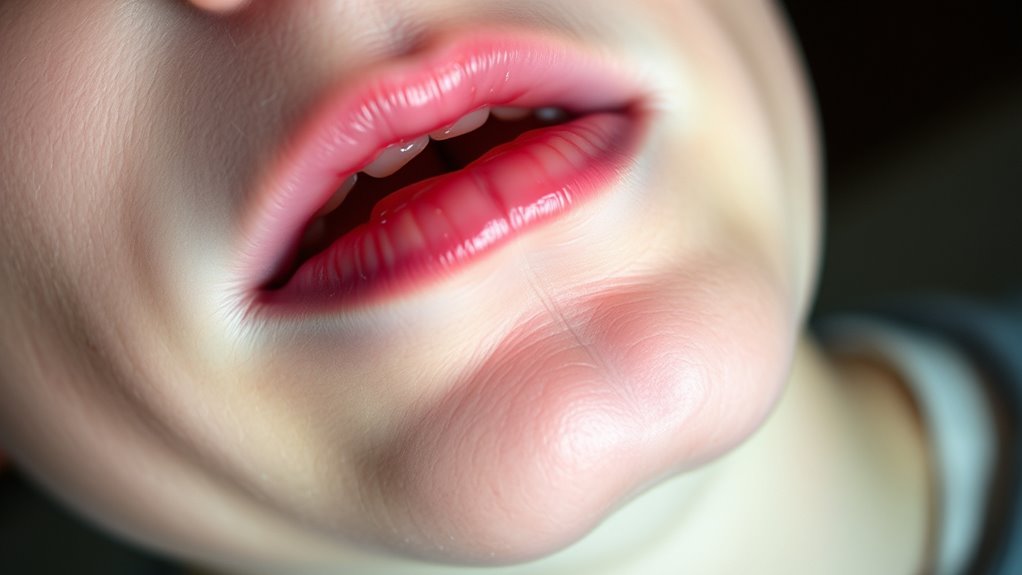
Persistent jaw pain or discomfort can be a clear warning sign that your wisdom tooth is causing trouble. You might notice jaw joint issues, such as clicking, aching, or difficulty opening your mouth fully. This pain often radiates to nearby areas, making everyday activities uncomfortable. In some cases, you may also experience facial numbness, which indicates nerve involvement. If your jaw feels sore or stiff and you notice numbness around your face, it’s a sign you should see a dentist promptly. Ignoring these symptoms can lead to more serious problems, like infections or nerve damage. Recognizing these warning signs early helps prevent further complications and ensures you get the proper treatment to relieve your discomfort.
Swollen or Tender Gums
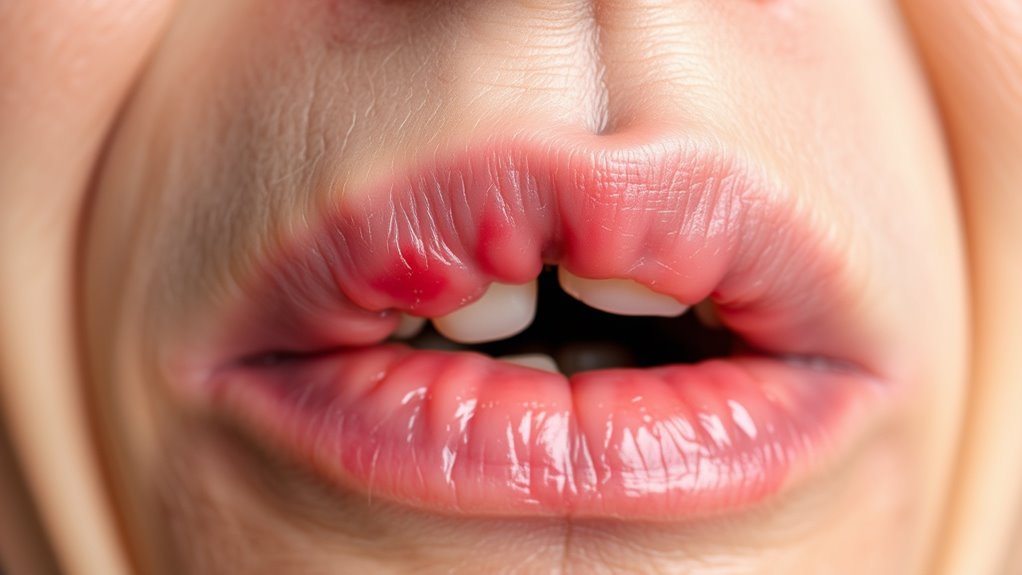
Swollen or tender gums around your wisdom tooth are common signs that your mouth is reacting to an infection or inflammation. You might notice increased gum sensitivity, making eating or brushing uncomfortable. The area may appear red and inflamed, and you could see slight tooth discoloration near the affected site. These symptoms often indicate your body is fighting off an infection. Using professional equipment ensures better quality recordings and clearer communication of these warning signs. Look out for:
Swollen gums and sensitivity around your wisdom tooth may signal infection or inflammation requiring prompt dental attention.
- Persistent gum swelling or tenderness
- Increased gum sensitivity when brushing or eating
- Discoloration around the wisdom tooth
- Swelling that worsens over time
Addressing these signs early can prevent more serious issues. If your gums remain swollen or tender, consult a dentist promptly to avoid further complications.
Unusual Bad Breath or Unpleasant Taste
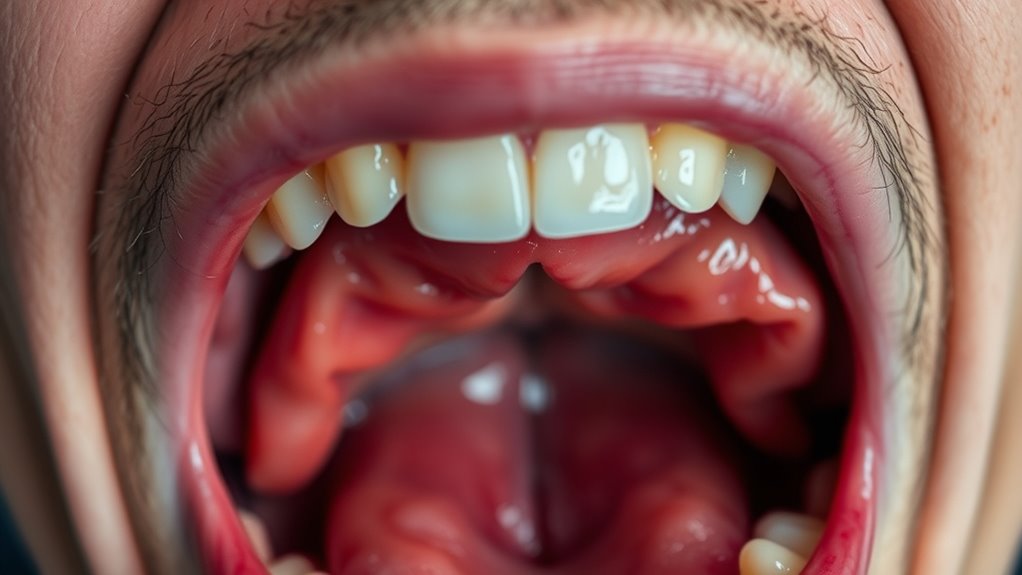
If you notice persistent bad breath or a strange metallic taste, it could be a sign your wisdom tooth is causing trouble. Changes in odor after meals might also point to an underlying issue. Don’t ignore these signals—they could indicate infection or decay that needs attention.
Persistent Halitosis or Metallic Taste
Have you noticed a constant bad taste or a metallic flavor lingering in your mouth? This persistent halitosis or unusual taste could be a sign that your dental hygiene or oral hygiene routines need attention. Bacteria buildup around wisdom teeth can cause foul odors and metallic sensations. To address this, consider:
- Improving your brushing and flossing habits daily
- Using mouthwash to reduce bacteria
- Visiting your dentist regularly for check-ups
- Keeping wisdom teeth clean and monitored
Neglecting these signs might lead to infections or other complications. Maintaining good oral hygiene routines is key to preventing ongoing bad taste issues. If the problem persists despite good habits, it’s time to consult your dentist for a thorough evaluation. Early intervention can save you discomfort later. Proper oral care is essential for overall health and can help prevent these issues from worsening.
Post-Meal Odor Changes
After eating, you might notice a sudden change in your breath or an unpleasant taste lingering in your mouth. This often happens when oral bacteria break down food particles left behind, producing foul-smelling gases. Poor dental hygiene can exacerbate these odor changes, especially if you don’t brush or floss thoroughly after meals. Wisdom teeth, in particular, can trap food and plaque in hard-to-reach areas, fueling the growth of oral bacteria. As bacteria multiply, they release compounds that cause bad breath or an unpleasant taste. Data analytics track progress and identify knowledge gaps in oral health, helping you understand and improve your dental hygiene routines. Maintaining good dental hygiene by cleaning thoroughly after meals helps reduce bacteria buildup. If you notice persistent odor changes after eating, it could be a sign that your wisdom teeth or other areas need professional attention.
Difficulty Opening Your Mouth Wide

Experiencing difficulty opening your mouth wide can be a warning sign that your wisdom tooth is causing trouble. You might notice mouth opening difficulties or feel a restriction in jaw movement. This discomfort often results from inflammation or infection around the wisdom tooth, leading to swelling and limited mobility.
- Reduced ability to yawn or speak comfortably
- Persistent jaw stiffness
- Pain when trying to open your mouth fully
- Feeling of pressure in the jaw area
These signs indicate you should pay attention to jaw movement restriction. If you struggle to open your mouth or experience ongoing discomfort, consult a dentist promptly. Ignoring these symptoms can lead to further complications and prolonged pain.
Earache or Headache Symptoms
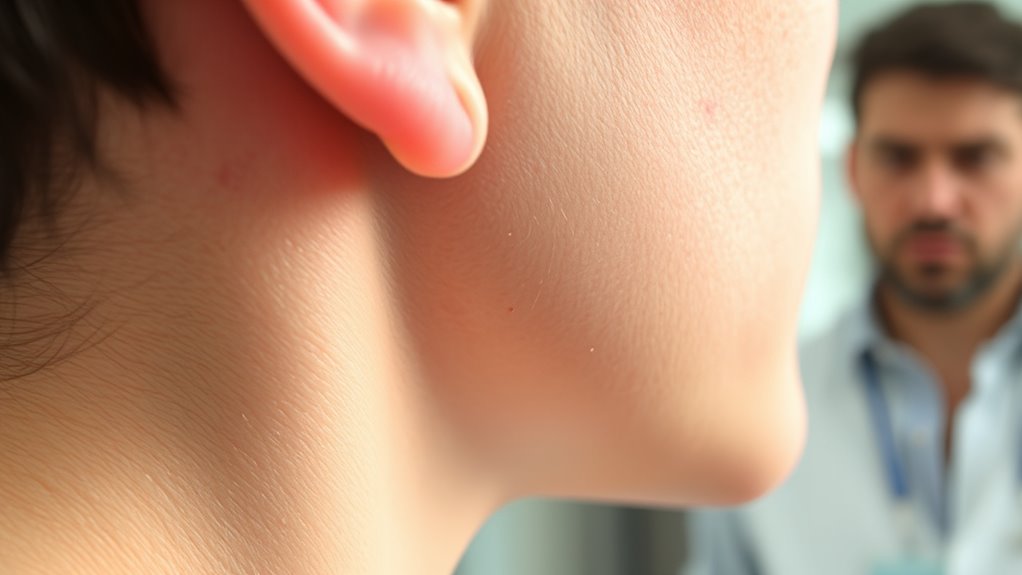
You might notice an earache or a dull headache, which could be a sign of your wisdom tooth pushing against your jaw. Referred ear pain and throbbing head discomfort are common symptoms that shouldn’t be ignored. These signs often indicate your tooth is causing more than just dental issues. Recognizing early warning signs can help you seek timely care and maintain your overall well-being.
Referred Ear Pain
Referred ear pain is a common warning sign associated with wisdom tooth problems, often manifesting as earaches or headaches without any direct ear infection. You might notice discomfort radiating to your ear, making it hard to pinpoint the source. This pain occurs because your jaw and ear share nerve pathways, leading to confusion in sensation. You may also experience:
- Tooth discoloration near the wisdom tooth
- Jaw stiffness that limits movement
- Swelling or tenderness in the jaw area
- Mild pain spreading to the side of your head
These symptoms can indicate underlying issues like impacted teeth or infection. Keep an eye out for changes in your bite or persistent discomfort, which may signal your wisdom teeth are causing more than just minor annoyance. Additionally, understanding how AI in Education is transforming personalized learning can help you stay informed about technological advancements that could impact future dental diagnostics and treatments.
Throbbing Head Discomfort
Throbbing head discomfort, such as persistent earaches or pounding headaches, can be a warning sign that your wisdom teeth are causing trouble. You might also notice jaw stiffness and facial swelling that accompany this pain. These symptoms suggest inflammation or infection near the impacted teeth, which can irritate surrounding nerves. Recognize the connection with the table below:
| Symptom | Possible Cause | Recommended Action |
|---|---|---|
| Headache or Earache | Wisdom teeth impaction or infection | Consult your dentist promptly |
| Jaw Stiffness | Muscle strain or nerve irritation | Monitor for worsening symptoms |
| Facial Swelling | Infection spreading to facial tissues | Seek immediate dental care |
Ignoring these signs could lead to more severe complications, so stay alert to these warning signals. An understanding of symptom severity can help determine when professional intervention is necessary.
Swelling Around the Cheek or Jaw Area

Swelling around the cheek or jaw area is often one of the first noticeable signs of a problematic wisdom tooth. You might see a puffiness or firmness that wasn’t there before. This swelling often results from gum inflammation caused by trapped food and bacteria. Poor dental hygiene can worsen the issue, leading to increased swelling and discomfort. Watch for symptoms like:
- Tenderness when touching the area
- Redness or warmth over the jaw
- Difficulty opening your mouth
- Persistent pain that worsens over time
This swelling indicates your body is fighting infection or irritation. It’s essential to address it early to prevent further complications. Regular brushing and flossing help reduce gum inflammation, but if swelling persists, see your dentist to evaluate the health of your wisdom teeth. Proper oral hygiene practices can help minimize inflammation and prevent worsening symptoms.
Unexplained Fever or General Malaise
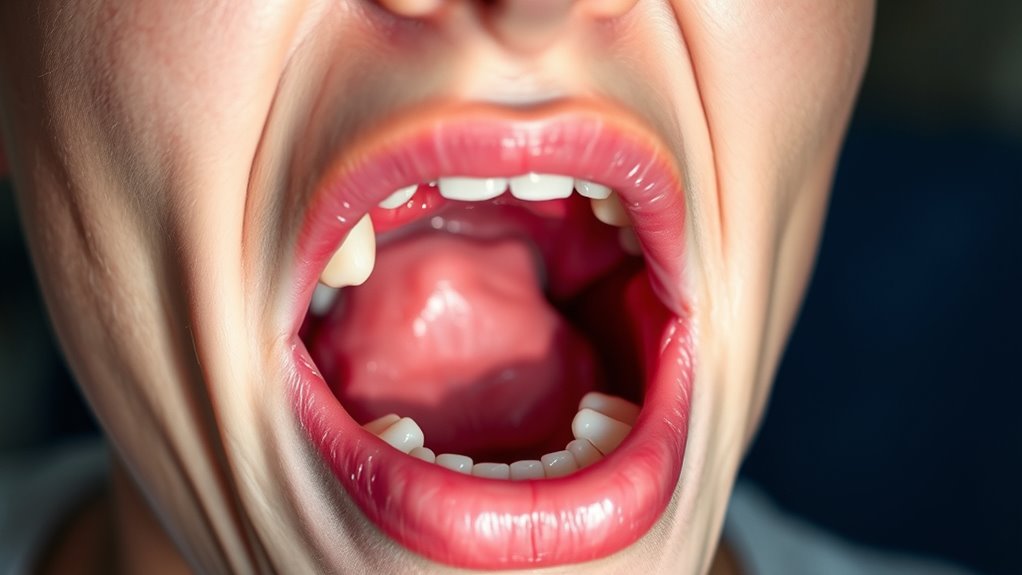
If your body is fighting an infection from a problematic wisdom tooth, you might notice an unexplained fever or a general feeling of malaise. These symptoms indicate your immune response is active, trying to combat bacteria or inflammation. Poor dental hygiene can worsen the infection, making symptoms more severe. Keeping your mouth clean helps reduce bacteria buildup and supports your immune system. To understand the signs better, consider this table:
| Symptom | Possible Cause |
|---|---|
| Unexplained fever | Infection spreading beyond tooth |
| Malaise | Body fighting infection |
| Bad taste or odor | Bacterial buildup |
| Swollen glands | Immune response |
| Fatigue | Systemic infection |
Stay alert—persistent fever or malaise warrants prompt dental care. Recognizing infection severity is crucial for timely treatment and avoiding complications.
Frequently Asked Questions
When Should I See a Dentist for Wisdom Tooth Issues?
You should see a dentist when you notice symptoms like pain, swelling, or difficulty opening your mouth, which could indicate wisdom tooth eruption issues. Regular check-ups help monitor your wisdom teeth, ensuring proper development. Follow oral hygiene tips such as gentle brushing and flossing around the area to prevent infections. Early dental visits can prevent complications, so don’t wait until pain worsens—schedule an appointment promptly when you suspect wisdom tooth problems.
Can Wisdom Teeth Cause Problems Even if They Don’T Erupt Fully?
Ever think wisdom teeth are harmless if they don’t fully erupt? Think again. Impacted nerves can become irritated or damaged, causing pain or numbness, and cyst formation can occur around hidden teeth, leading to infection or damage to nearby teeth. So, even if your wisdom teeth stay under the surface, they can still cause big problems. Regular check-ups help catch issues early before they turn into costly, painful surprises.
Are There Home Remedies to Ease Wisdom Tooth Pain?
If you’re wondering about home remedies for wisdom tooth pain, natural remedies can offer some relief. You might try rinsing with warm salt water to reduce inflammation, applying a cold compress to numb the area, or using over-the-counter pain relievers for pain management. Clove oil is also known for its natural numbing properties. Remember, these methods can ease discomfort temporarily, but consult your dentist for proper treatment if pain persists.
How Long Does Wisdom Tooth Discomfort Typically Last?
When you’re steering the gentle waves of wisdom tooth discomfort, it usually lasts a few days to a week, but it can linger if symptoms like tooth sensitivity and gum swelling persist. You might find relief with home remedies, but if pain continues beyond a week or worsens, it’s a sign to see your dentist. Managing inflammation and keeping the area clean can help speed up your comfort journey.
What Are the Risks of Delaying Wisdom Tooth Extraction?
Delaying wisdom tooth extraction can lead to impacted complications, such as pain, swelling, and damage to adjacent teeth. You also increase infection risks, as bacteria can build up around the partially erupted tooth. Over time, these issues may worsen, making extraction more complicated and costly. It’s best to address wisdom tooth concerns promptly to prevent these risks and avoid more serious oral health problems later on.
Conclusion
Keep an eye on these signs as if they’re whispers from your body, guiding you through the shadows of late summer. Ignoring them is like leaving a flickering candle unattended — the flames could turn into a wildfire. Addressing wisdom tooth issues now is your shield, a beacon guiding you away from deeper pain and danger. Trust your instincts; early action keeps your health’s flame burning bright and steady.









